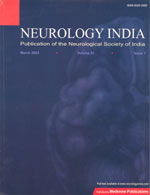
|
Neurology India
Medknow Publications on behalf of the Neurological Society of India
ISSN: 0028-3886
EISSN: 0028-3886
Vol. 55, No. 3, 2007, pp. 260-266
|
 Bioline Code: ni07085
Bioline Code: ni07085
Full paper language: English
Document type: Review Article
Document available free of charge
|
|
|
Neurology India, Vol. 55, No. 3, 2007, pp. 260-266
| en |
Immunotherapy for fungal infections with special emphasis on central nervous system infections
Parameswaran, Iyer G. & Segal, Brahm H.
Abstract
Opportunistic fungal infections are major causes of morbidity and mortality in the immunocompromized. Fungi have evolved complex and coordinated mechanisms to survive in the environment and the mammalian host. Fungi must adapt to "stressors" in the host, including nutrient scarcity, pH and reactive oxygen and nitrogen intermediates, in addition to evading host immunity. Knowledge of the immunopathogenesis of fungal infections has paved the way to promising strategies for immunotherapy. These include strategies that increase phagocyte number, activate innate host defense pathways in phagocytes and dendritic cells and stimulate antigen-specific immunity (e.g., vaccines). Immunotherapy must be tailored to specific immunocompromized states. Our review focuses on cryptococcosis and coccidioidomycosis because of the propensity of these diseases to involve the central nervous system (CNS). The CNS has long been considered "immunologically privileged" in the sense of being isolated from normal immune surveillance. This notion is only partially accurate. Immune-based therapies for fungal CNS disease are at an exploratory level and merit further evaluation in clinical trials.
Keywords
Aspergillosis, central nervous system fungal infections, cryptococcosis, immunotherapy, opportunistic infections
|
| |
© Copyright 2007 Neurology India.
Alternative site location: http://www.neurologyindia.com
|
|
